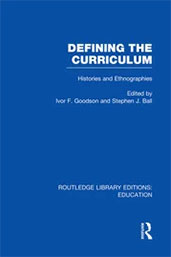Defining the Curriculum: histories and ethnographies
Subjects for Study: towards a social history of curriculum
Applying this to subject groups and sub-groups a number of factors would be relevant:
- subject group/sub-group position in hierarchies of subjects (current power and status);
- their current position regarding resource allocation in schools (current resources);
- patterns of career and age position of practitioners (current career patterns).
Subjects with low status and resources and poor career patterns, like rural studies, therefore embraced the opportunity to establish a new intellectual identity and occupational role. Established high status subjects conversely ignored the opportunity but contested the new contenders' right to claim similar academic status (and thereby establish parity of status and resources and a share therein). Carson has provided the rationale for the rural studies sub-groups' move to promote an environmental studies A-level: 'because if you didn't you wouldn't get any money, any status, any intelligent kids.'
Conclusion
I have been concerned to show that curriculum histories can be a valuable complement, indeed at times an active agency, in the development of explanatory frameworks. The essential value of such histories is that they are immersed in the complexity of the social process. They develop from the desire to understand particular events not from a desire to prove particular theories. The curriculum historian will often travel with ideological and theoretical baggage packed away. This implicitness, whilst avoiding the primacy of theoretical verification, should not limit theoretical aspiration. The curriculum historian should be concerned to aid the generation of theories about actions and events in specific historical conditions. In this way the historian can play an important role in the theoretical enterprise and in the making of agendas for further studies.
Of course, the specificity of curriculum histories often acts against their capacity for generalization. The model of subject change developed herein clearly has many limitations. What about pastoral systems, falling rolls, whole curriculum planning, pupil demands? Does this apply to subjects like classics, economics or, dare we mention it, sociology? What about subjects where industrial and external forces are more clearly involved? What are the factors behind 'the changing climates for action' that have been discerned? What about current changing climates where the autonomy of the educational system and the rules of the game defined therein are challenged?
